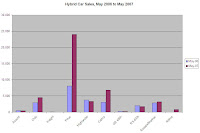It's a common issue with new hybrid car owners. They expect to get the high fuel economy they were promised by the EPA right out of the box. Many even feel like they have been cheated somehow. I mean, didn't they buy a hybrid for the high MPG rating on the sticker?
For instance: CommuterPageBlog: Our new hybrid - an update
However, the most important feature, fuel economy, has been a big disappointment. We've averaged only about 31 miles per gallon--no better than lots of economy vehicles that are not hybrids.
There are at least 5 reasons why you shouldn't expect to hit that number, at least right away.
- EPA MPG ratings are flawed
- What's the temperature like?
- The engine needs to be 'broken in.'
- Bad habits die hard
- You don't have to accelerate like your granny
EPA Ratings Are FlawedFirst of all,
the EPA MPG rating system is flawed. It is currently being updated and new 'real world' figures will be ready for the model 2008 year. In the meantime, if you bought a 2007 or earlier hybrid car, your EPA ratings are based on idealized conditions. For instance, the EPA assumed you would be driving without an air conditioner.
For this reason, everyone who buys a new car should expect to get lower fuel economy than what they saw on the sticker. Most people realize this but for some reason we think it should be different for hybrids.
What's the temperature outside?Your fuel economy depends greatly on the current weather conditions, believe it or not. It has, partly, to due with the time it takes your engine to heat up to optimum levels. When you first start your car up, you should be getting the worst fuel economy you will see for the day. So, if you are taking short trips, your mpg will be lower than you expected since your engine never quite warmed up.
Because of that, your fuel economy will be much higher in the summer than the winter. If you keep track of your gas receipts, plot out your mpg over the year. You'll see a nice curve upwards during the summer months. If you use your air conditioner or roll down your windows, it won't go as high as it could, but that's up to you.
The engine needs to be 'broken in'Just like that new car smell, your engine needs to be aired out. After a few months, you will see a marked improvement in fuel economy, usually just after you change the oil for the first time. I'm not a mechanic, so I can't explain this one. But talk about this issue on any discussion board on hybrid cars and you'll see the same comment time after time.
Of course, another possibility is it's not the car that needs to be broken in, it might just be the driver.
Bad habits die hardLet's face it. You've probably never worried too much about your mpg before now. So, you may be an aggressive driver with bad habits to break. It takes time to re-learn how to drive. Pay attention to the mpg readings (if you have one) and pay attention to what makes that number climb.
For instance, your mpg rating starts dropping dramatically as you get over the speed limit on the highway. Pay attention to the reading and you'll probably start slowing down.
Also, don't coast to a stop. Gently apply the brakes to get the most out of your regenerative braking. If you don't use regenerative braking to recharge your batteries, the gas engine does. And you can guess what that does to your gas gauge.
Pretty soon you'll be looking to repeat the good actions. Then they'll become habits. It takes time, but eventually you can retrain yourself.
Which brings up my last point.
Don't Accelerate Like Your GrannyFor some reason, people always assume that if they just accelerated at the slowest rate possible, then they'll get the best fuel economy rating. It just isn't true. Most likely, you're ruining your mpg.
Your engine is designed to be most efficient at higher speeds. From 0-10, you're getting a horrible return on your gas usage. Speed up at a brisk pace (don't jack rabbit!) and you'll get out of that bad area. This is also true for full hybrids. So get out of granny mode and drive.
As for the quote above, the new hybrid car owner from commuterpageblog blames his low numbers on his short drives. Short, 3 mile trips aren't going to get you out of the engine warm up stage. I would bet, however, that this isn't the end of the story. If he continues to pay attention to what he's getting, his numbers will improve even on these short trips.
Follow the links if you're looking for
fuel economy tips or perhaps you have heard stories about
hypermilers and want to
start hypermiling yourself.







 Follow me on Twitter
Follow me on Twitter
